- FROM THE TOP!
- It’s POLAR’S Birthday!
- Open House: Build Gender Inclusive Services
- June 21st is National Indigenous Peoples Day
- POLAR’S PEOPLE:
- The 2019 Frolics Festival in Cambridge Bay
- POLAR Snowmobile Training
- LEARNING AND PERFORMANCE
- POLAR welcomes new students for the summer months
- New Bird of the Week Column!
- Inuinnaqtun/Inuktitut Word of the Week - Mamariyara - ᒪᒪᕆᔭᕋ
- Are you ready to Talk the Talk?
- WORKPLACE NOTICES:
- Information Management Tip of the Week
- I saw the sign!
- UPDATES
- POLAR Events Calendar
- Key Outcomes from Senior Management Committee
- POLAR Priorities Update
FROM THE TOP!
It’s POLAR’S Birthday!
POLAR is proud to celebrate its 4th anniversary as a federal organization. We would like to thank everyone, from all levels, who have helped make this possible. We wouldn’t be the organization we are today without the tremendous support and dedication of everyone involved.
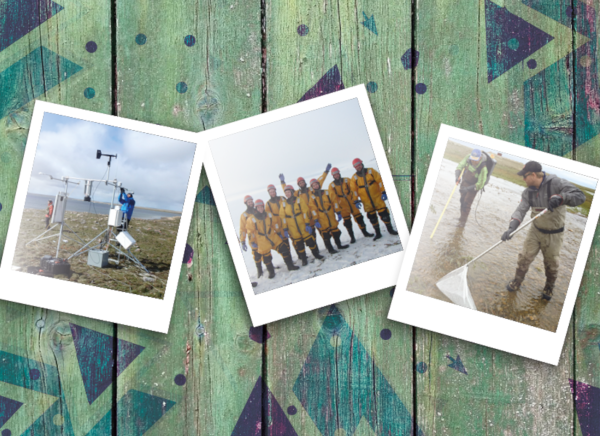
We are headed towards another great year, one which will see us continue to grow as an organization and keep spreading awareness related to Canada’s Arctic region.
Happy birthday to POLAR, happy birthday to US!
Open House: Build Gender Inclusive Services
The Government of Canada is working to advance gender diversity and inclusion, with many changes already underway. The Policy Direction to Modernize the Government of Canada’s Sex and Gender Information Practices supports a whole-of-government approach to being inclusive of people of all genders, and embeds gender diversity in service design and delivery. The policy direction will help departments and agencies across the public service align their practices in a coordinated, consistent way.
The Treasury Board Secretariat (TBS) is hosting an open house to explain the policy direction on sex and gender information. The session will help you to understand why the changes are necessary, and how to embed gender diversity in your work.
The open house is open to anyone in the public service. Whether your work will be directly implicated, or you’re just interested to learn more about the Government of Canada’s approach to gender diversity and inclusion.
Join the open house in person or online on Monday, June 17 from 2:00 p.m. to 3:00 p.m. ET – 90 Elgin Street, Ottawa, Ontario. To register, please visit: Building Gender Inclusive Services.
For more information, please contact InclusiveServicesInclusifs@tbs-sct.gc.ca.
June 21st is National Indigenous Peoples Day
National Indigenous Peoples Day is a day for all Canadians to recognize and celebrate the unique heritage, diverse cultures, and outstanding achievements and contributions of First Nations, Inuit and Métis Peoples. National Aboriginal Day, as it was named at the time, was first celebrated on June 21, 1996, after being recognized through a proclamation by then Governor General Roméo LeBlanc.

In cooperation with Indigenous organizations, the Government of Canada chose June 21, the summer solstice, for National Aboriginal Day, now known as National Indigenous Peoples Day (NIPD).
Canadians can attend various events across the country such as the Ottawa Indigenous Solstice festival and Aboriginal Peoples Television Network’s (APTN) Indigenous Day’s Live in Whitehorse, Winnipeg and Calgary. Check out the full list of all the government sponsored events here.
- Join the conversation on social media:
- Twitter: @GCIndigenous and @GovCanNorth use the hashtag #NIPDCanada
- Facebook: GCIndigenous, GovCanNorth and @GCIndigenousHealth
- Instagram: @gcindigenous use the hashtag #NIPDCanada
POLAR’S PEOPLE
The 2019 Frolics Festival in Cambridge Bay
As you might know, every year in May, Cambridge Bay celebrates the “Frolics Festival”. This festival has traditionally kicked off spring for the residents of Cambridge Bay and is the season in which most of the preparation for the next winter begins!


To mark the joyous occasion, POLAR participated in these festivities by decorating a truck with balloons and driving around the community handing out goodie bags. Being part of the festivities was very exciting, and a great opportunity to get involved with the community of Cambridge Bay.
POLAR Snowmobile Training
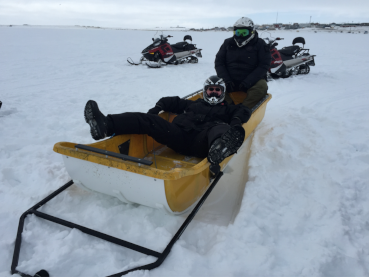


In Cambridge Bay and the surrounding area, travel by foot is both impractical and dangerous due to local wildlife and extreme weather conditions. Knowing how to operate a snowmobile is a very valuable skill for anyone living or researching in the area.
In order to access and document data from various experiments in hard to reach areas, POLAR staff use snowmobiles to haul research equipment and tools (such as the SmartQAMUTIK) as well as supplies to areas around the CHARS campus. If you’re planning an extended stay at the CHARS campus or Cambridge Bay, consider this a skill that all employees should be trained on. It might just come handy in during the winter months!
LEARNING AND PERFORMANCE
POLAR welcomes new students for the summer months
You may have seen a few new faces around the office as many students have arrived for the summer from both Federal Student Work Experience Program (FSWEP) and Indigenous Student Employment Opportunity (ISEO). Congratulations to those who have joined us and good luck over these next few months!
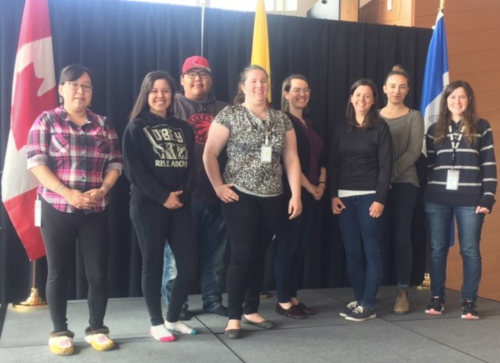

Students are encouraged to make the most of student events occurring throughout Canada. These events are meant to assist people new to the federal service, and also make for great networking opportunities. You will find the list of events here.
New Bird of the Week Column!
Welcome to our new spring and summer Bird of the Week column, presented by Emma Sutherland, to educate staff on birds species in the Arctic and their importance for POLAR and northern communities. This week’s column is on the glaucous gulls.
This species breeds across the Arctic, with individuals nesting in Canada, Alaska, Iceland, Greenland and the Russian Republic. It is a large white-winged gull, with juveniles often displaying brown flecked plumage. Other gull species in Cambridge Bay include the Sabine’s Gull Xema sabini, which can be distinguished by its dark head, pointed beak and dark wing tips, as well as the Thayer’s gull, which is a subspecies of the Iceland gull Larus glaucoides. The latter can be distinguished by dark wingtips and narrower bills than glaucous gulls.
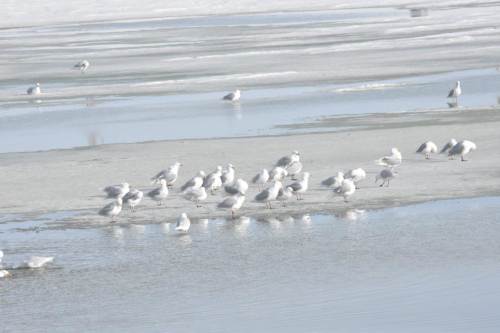
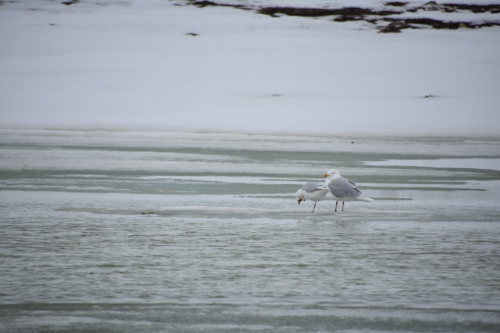
The POLAR team gathers information on avian species in the region, establishing baseline data about species distribution and potential range expansions in relation to climate change. Glaucous Gulls nest in many different habitats, ranging from open tundra to cliffs. They are extremely adaptable, potentially allowing them to be resilient to the effects of climate change. As a generalist feeder, this species sustains itself on a varied diet including fish, invertebrates, eggs and berries. They also predate shorebird eggs, and have a significant impact on many of the long-distance migrants that nest in Cambridge Bay and are under study by POLAR researchers. They are also known to forage on human food scraps, and are thus a common sight at the Cambridge Bay dump!
Inuinnaqtun/Inuktitut Word of the Week - Mamariyara - ᒪᒪᕆᔭᕋ
The Inuinnaqtun/Inuktitut word of the week is mamariyara. This word is the same in both Inuinnaqtun and Inuktitut. It means “I like the taste of it”. It is pronounced: ma-ma-ree-ya-ra
Listen to the pronunciation here.
Are you ready to Talk the Talk?
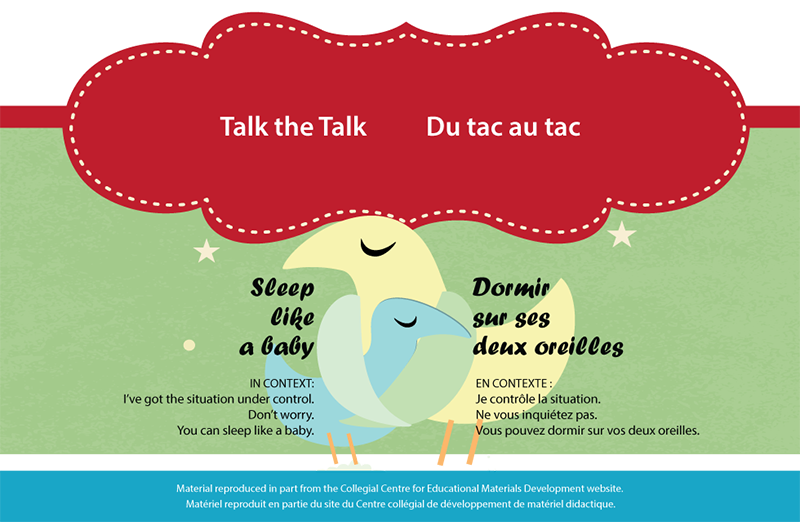
WORKPLACE NOTICES
Information Management Tip of the Week
In this week’s Information Management (IM) tip of the week, our colleague Renée Bergeron gives us useful tips on how to manage our filing systems with efficient naming and itemizing profiles.
The most important thing to remember about file naming is to be consistent and descriptive in naming and organizing your files, making it easy to know what it contains and where it’s located.
- Information to consider including in file names:
- Project or experiment name or acronym
- Location/spatial coordinates
- Researcher name/initials
- Date or date range of experiment
- Type of data
- Conditions
- Version number of file
- Three letter file extension for application specific files (computer generated)
These are suggestions; include whatever information will allow you to distinguish your files from each other and clearly indicate to you what is in them.
- Other tips for file naming:
- A good format for dates is YYYY-MM-DD. This makes sure all your files stay in chronological order, even over many years.
- Don’t make file names too long; longer names do not work well with all types of software.
- Special characters should be avoided: ~ ! @ # $ % ^ & * ( ) ` ; < > ? , [ ] { } ‘ “
- For sequential numbering, use leading zeros to ensure files sort properly. For example, use “0001, 0002…1001, etc” instead of “1, 2…1001, etc.”
- Do not use spaces, because they are not recognized by some software. Instead use underscores (file_name), dashes (file-name), no separation (filename), or camel case (FileName).
For more information regarding efficient naming conventions and how they can improve your personal efficiency when it comes to email management, please email renee.bergeron@polar.gc.ca
I saw the sign!
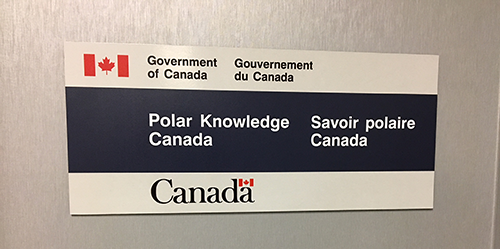
Signage and name plates for the Ottawa office are now complete. We are delighted with the finished look! What do you think? Thanks to everyone who contributed to this project!


UPDATES
POLAR Events Calendar
Below you will find the latest version of the POLAR events calendar, including upcoming events and conferences for your information.
Note: The calendar is subject to change. Any travel has to be pre-approved by Directors (and above for international destinations).
Please send any calendar updates or additions to Jerry Kallada at jerry.kallada@polar.gc.ca
POLAR events calendar: June 5, 2019
Key Outcomes from Senior Management Committee
- Here are the key outcomes and decisions deriving from the May 22 Senior Management Committee meeting:
- Week of June 10-14 is National Public Service Week. HRPR to lead in proposing an activity for all employees.
- A forward agenda will be developed for SMC meetings to better plan for required governance decisions.
POLAR Priorities Update
The latest Priorities Update document is here. Take a look at the priorities and activities of your colleagues between June 5 to June 30.
